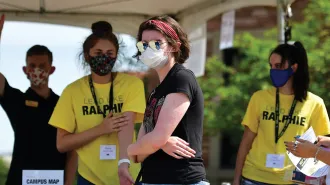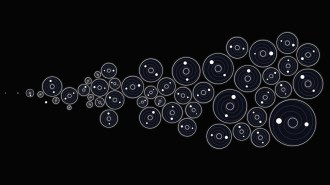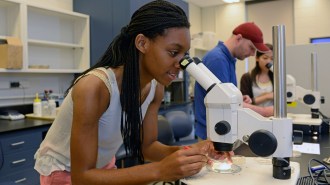Chart
Sign up for our newsletter
We summarize the week's scientific breakthroughs every Thursday.
-
 Health & Medicine
Health & MedicineWhere are the long COVID clinics?
For people with long COVID, finding a place to get appropriate medical care is a challenge.
-
 Science & Society
Science & SocietyMass shootings and gun violence in the United States are increasing
In the wake of mass shootings in Buffalo, N.Y., and Uvalde, Texas, a gun violence researcher shares what can be done to reduce gun violence deaths.
By Nikk Ogasa -
 Climate
ClimateHow much does eating meat affect nations’ greenhouse gas emissions?
How much meat eating affects worldwide greenhouse gas emissions comes clear in new country-by-country analyses.
-
 Health & Medicine
Health & MedicineCOVID-19 testing in schools works. So why aren’t more doing it?
School COVID-19 testing programs can keep kids in class and safe, but face challenges ranging from deciding on a testing strategy to parental buy-in.
-
 Humans
HumansFossils and ancient DNA paint a vibrant picture of human origins
Paleoanthropologists have sketched a rough timeline of how human evolution played out, centering the early action in Africa.
By Erin Wayman -
 Science & Society
Science & SocietyHow science museums reinvented themselves to survive the pandemic
The pandemic forced science museums to reach out to their communities, and some built a wider following.
By Emily Anthes -
 Health & Medicine
Health & MedicineThe surge in U.S. coronavirus cases shows a shift in who’s getting sick
Younger, unvaccinated people are a rising share of COVID-19 cases, raising concerns anew that lack of vaccine access may hit minority populations hard.
-
 Particle Physics
Particle PhysicsHow matter’s hidden complexity unleashed the power of nuclear physics
In the last century, physicists learned to split atomic nuclei and revealed a complex world of fundamental particles.
-
 Health & Medicine
Health & MedicineHow 5 universities tried to handle COVID-19 on campus
U.S. colleges opened in the fall with a patchwork of control measures to keep COVID-19 at bay.
-
 Physics
PhysicsExplore every gravitational wave event spotted so far
This interactive visualization reveals the diversity of smashups that generate gravitational waves.
By Emily Conover and Nadieh Bremer -
 Science & Society
Science & SocietyThese 6 graphs show that Black scientists are underrepresented at every level
In the U.S., Black people are underrepresented in STEM fields, both as students and in the workforce.
-
 Health & Medicine
Health & MedicineCoronavirus shutdowns don’t need to be all or nothing
Governments are implementing more targeted restrictions like limiting restaurant capacity to slow a fall surge. Research suggests they could work.